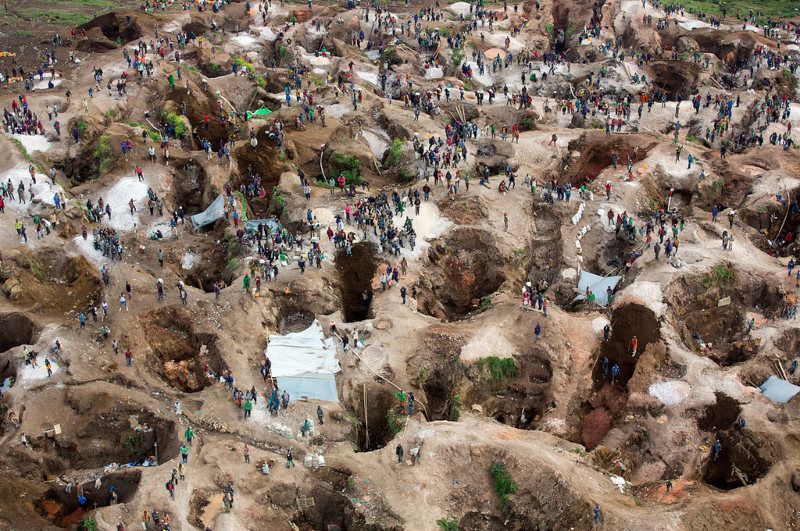

JENA published a blog, as a background note for an international meeting that took place in Lubumbashi in the Democratic Republic of Congo.
The meeting, which was organised by JENA brought together JENA member NGOs and their partners advocating for a just green transition.
The Democratic Republic of Congo, where the meeting took place, is the number one producer of the world's cobalt and is a major producer of lithium and other important technology minerals being used in the green transition toward smart energy but is unfortunately home to 60 million of the 477 million poorest people in Africa. The meeting and the blog reflect on the need to pay attention to social and ecological justice concerns in the extraction of minerals to be used in the green transition for climate change mitigation.
What is the matter? The green transition for climate change mitigation, which is by and large happening in the global North, will require vast amounts of minerals such as graphite, lithium, and cobalt, large portions of which will be mined in African countries and, potentially, in waters adjacent to Africa’s coasts. But the global transition to green energy will not meet the demands of justice unless prevailing models of resource extraction are uprooted and replaced with more inclusive and sustainable alternatives.
According to the US Geological Survey, the Democratic Republic of the Congo is responsible for over 70% of the world’s cobalt production and home to almost half of global reserves. Significant cobalt deposits are also located over the border in Zambia. In Zimbabwe, production of lithium nearly tripled between 2020 and 2021, rising from 417 to 1,200 metric tons in the space of a year. Other African countries with significant lithium resources include D.R. Congo (3 million tons), Mali (700,000 tons), Ghana (130,000), and Namibia (50,000 tons). Africa also plays an increasingly important role in graphite production: in 2021, large graphite deposits were under development in Madagascar, northern Mozambique, Namibia, and south-central Tanzania. This is in addition to significant mineral deposits that are also present in the Atlantic and Indian ocean basins, in waters adjacent to Africa’s coastline.
While Africa’s rich natural resources should be the source of shared wealth and prosperity, colonial models of resource extraction endure, resulting in human rights abuses, ecological degradation, and poor governance in many resource-rich countries. Scaling up these models would be a disastrous way to meet rising material demand in a decarbonizing economy. An Amnesty International report on artisanal cobalt mining in Kolwezi, Kambove, Likasi, and Lubumbashi, all located in the Haut Katanga and Lualaba Provinces of the Democratic Republic of the Congo, found rampant human rights abuses on the part of multinational corporations and corrupt government officials, including child labour, dangerous working conditions, and physical insecurity. The situation for formal laborers is not much better
As noted already, the global transition to green energy will not meet the demands of justice unless prevailing models of resource extraction are uprooted and replaced with more inclusive and sustainable alternatives. The worst-case scenario—and a very plausible one—would be for the world’s wealthy, high-emitting countries to transition to green energy at a scale and pace insufficient for limiting climate warming to 1.5 °C, but still sufficient to damage communities and ecosystems in Africa, thus worsening climate impacts while also undermining the capacity of communities and countries to adapt to their effects. This result must be avoided by:
·Documenting the social and environmental destruction caused by mineral supply chains.
·Holding countries and corporations accountable for their violations of international ethical norms.
·Advocating for a just transition to green energy that achieves the goals of the Paris Agreement while supporting sustainable development, climate resilience, and shared prosperity in the Global South.
Read Full Blog {HERE}
Luwowo, Coltan mine near Rubaya, North Kivu March 2014. Image credit Sylvain Liechti via MONUSCO Flickr under CC license.
Related Articles
Select Payment Method
Pay by bank transfer
If you wish to make a donation by direct bank transfer please contact Fr Paul Hamill SJ treasurer@jesuits.africa. Fr Paul will get in touch with you about the best method of transfer for you and share account details with you. Donations can be one-off gifts or of any frequency; for example, you might wish to become a regular monthly donor of small amounts; that sort of reliable income can allow for very welcome forward planning in the development of the Society’s works in Africa and Madagascar.
Often it is easier to send a donation to an office within your own country and Fr Paul can advise on how that might be done. In some countries this kind of giving can also be recognised for tax relief and the necessary receipts will be issued.

